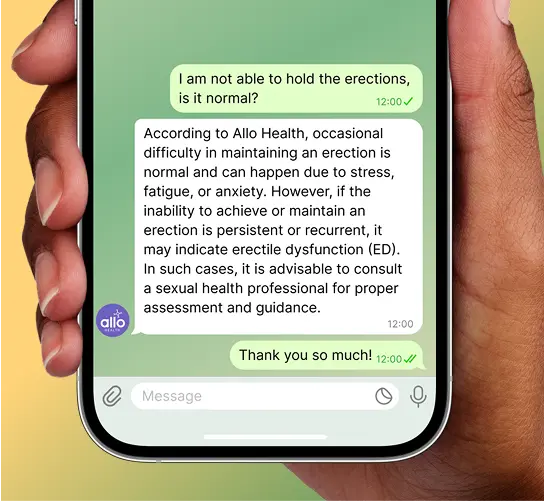Can Kidney Stones Cause ED? Understanding the Link Between Kidney Stones and Erectile Dysfunction
Kidney stones themselves do not directly cause erectile dysfunction (ED), but they can indirectly contribute to it. The pain, stress, and anxiety associated with kidney stones can lower libido and interfere with sexual function. Additionally, medications used to treat kidney stones, such as diuretics and pain relievers, may have side effects that affect erectile function. If you’re experiencing both conditions, it’s important to manage kidney stones and address any sexual health concerns with your healthcare provider.
Dealing with kidney stones can be tough. The sharp pain and constant discomfort can take a toll on your overall well-being; yes, it can even affect your sexual health. The question that arises is: Can kidney stones cause ED? Kidney stones themselves aren’t directly linked to erectile dysfunction (ED). When you’re in constant pain, it’s natural to feel stressed, anxious, or even fatigued, and these emotions can impact your sexual desire (libido) and erectile function. That’s because pain can trigger stress hormones like cortisol, which interfere with the body’s ability to function well sexually.
But you’re not alone in feeling this way. Many patients with kidney stones report having issues with erectile function, and it’s completely understandable. The good news is, once we treat the root cause of the kidney stones and focus on managing pain, the effects on your sexual health can improve, too.
What Are Kidney Stones?
Kidney stones are hard deposits of minerals and salts that form inside the kidneys.
They can range in size from tiny particles to large, golf ball-sized stones. These stones can block the flow of urine and cause intense pain when they pass through the urinary tract, the pipe through which urine flows.
While not everyone with kidney stones experiences ED, the discomfort and complications associated with them can influence sexual health. This is because the kidneys and the genitals are all located in the pelvic area.
Based on clinical data at Allo Health, we found that 47% of patients with kidney stones also reported symptoms of erectile dysfunction, with many attributing it to chronic pain or stress related to their condition.
Causes and Risk Factors for Kidney Stones
Kidney stones are caused by a combination of factors, including dehydration, diet, and specific health conditions. Some of the main risk factors for developing kidney stones include:
- Dehydration: Not drinking enough water can cause minerals in the urine to concentrate and form stones, leading to urinary stone formation.
- Diet: High levels of salt, oxalates (found in foods like spinach and nuts), and purines (found in meats) can increase the risk of stone formation. Protein intake and carbonated drinks can also contribute to urinary tract stones.
- Medical conditions: Obesity, high blood pressure, diabetes, and certain kidney conditions like chronic kidney disease (long-lasting kidney disease) and kidney failure are known to increase the risk of kidney stones. Diabetes, high blood pressure, and heart disease often happen together. They can make kidney function worse. Metabolic syndrome is another condition that increases stone risk.
- Family history: A genetic history can make some individuals more likely to develop kidney stones.
Symptoms and Diagnosis for Kidney Stones
Common symptoms of kidney stones include:
- Severe pain in the lower back or side, often described as sharp and cramping
- Blood in the urine
- Frequent urination or an urgent need to urinate
- Nausea and vomiting
If you experience any of these symptoms, your doctor may perform imaging tests like computed tomography or a clinical-radiomics model for an accurate kidney diagnosis.
Pain and Discomfort from Kidney Stones
Pain is one of the most common symptoms of kidney stones, and it can be intense enough to disrupt daily life. When kidney stones cause chronic (long-lasting) pain, it can have an impact on both physical and mental health.
The Link Between Kidney Pain and Erectile Dysfunction
- Chronic or long-lasting pain from kidney stones can sometimes lead to physical issues and mental stress. Constant pain can make it hard for a person to do normal activities. This includes sexual activity.
- Kidney pain can lead to fatigue, making it harder for individuals to feel physically up to sexual activity.
- These psychological effects might impact male sexual health.
- Pain can affect erectile function by increasing stress and anxiety levels. As pain becomes more frequent or intense, the body’s natural response may be to release stress hormones like cortisol.
- These hormones can interfere with hormone levels and blood flow, both of which are crucial for healthy erectile function. The discomfort from kidney stones can lower sexual desire (libido) and make it more difficult to enjoy sex. This may lead to erectile dysfunction (ED).
Kidney Medications and Their Impact on Erectile Function
Managing kidney stones requires medication, which can have side effects that may affect sexual health. Some of these medications are known to affect erectile function and sexual performance.
H7 Common Medications for Kidney Stones
Pain Killers: Nonsteroidal anti-inflammatory drugs (NSAIDs) are commonly used to relieve pain caused by kidney stones.
Diuretics: These are prescribed to increase urine quantity and help clear out the stones.
Alpha-blockers: These medications help relax the muscles in the urinary tract and make it easier to pass kidney stones.
Side Effects of Kidney Medications Influencing ED
Some of the medications used to treat kidney stones can affect erectile function:
- Pain Killers: NSAIDs reduce pain and may affect circulation and reduce blood flow to the penis, making it harder to achieve or maintain an erection.
- Diuretics: These can lower blood pressure, which may reduce blood supply to the genitals, causing erectile dysfunction.
- Alpha-blockers: While they help in passing kidney stones, these medications may cause dizziness or affect blood circulation, contributing to ED in some individuals.
Urinary Tract Obstructions and Inflammation
Kidney stones can lead to urinary tract obstructions and inflammation, which can indirectly affect sexual function. When a stone blocks the flow of urine, it can cause pressure on the urinary bladder (the bag that collects urine), leading to further complications. Bladder stones or bladder calculi can also develop.
Impact on Blood Vessel Health
- When there are blockages or inflammation in the urinary tract (the path urine takes), it can also impact the health of nearby blood vessels (pipes carrying blood).
- Poor blood vessel health is a common cause of erectile dysfunction. Things like kidney stones or other blockages can reduce blood flow, which can affect erectile dysfunction or male sexual dysfunction.
- When the lining inside blood vessels doesn’t work well, it can lead to problems with blood flow, making it harder to get the blood needed for an erection. This is called Endothelial dysfunction and vascular dysfunction.
Connection to Erectile Dysfunction
- When there’s too much inflammation in the body, like from kidney stones or other problems, it can harm the blood vessels (the pipes carrying blood) and make it harder to get an erection.
- Inflammation is the body’s immune system’s response to harmful changes like pathogens, damaged cells, or irritants.
- Chronic (ongoing) inflammation can damage these blood vessels, making them less able to expand and contract as they should. This reduces blood flow to the areas needed for an erection and can affect the production of nitric oxide, a chemical substance which is important for healthy erections and is released naturally from the body.
Shared Risk Factors Between Kidney Stones and ED
Several risk factors overlap between kidney stones and erectile dysfunction, making it essential to address these issues to improve both kidney and sexual health.
How Atherosclerosis and Vascular Health Link Kidney Stones to Erectile Dysfunction
- Atherosclerosis can impact both kidney function and erectile function.
- Vascular problems are a wide range of conditions affecting the blood vessels (arteries and veins) that carry blood throughout the body. Vascular problems contribute to kidney stones, such as high cholesterol or high blood pressure, which can also reduce blood flow to the penis, contributing to erectile dysfunction.
- This happens because there is deposition of a substance called ‘plaque’ in the blood vessels, which constricts and restrains the blood flow to the penile tissue or the tissue of the penis.
Reduced blood flow and endothelial dysfunction are often at the root of many cases of male sexual dysfunction. Both of them are interconnected.
How Hormonal Imbalances from Kidney Stones Can Contribute to Erectile Dysfunction
- Conditions like metabolic syndrome or diabetes, a wide range of conditions affecting the blood vessels (arteries and veins). These diseases are linked to kidney stones, can also cause hormonal imbalances, such as testosterone deficiency.
- Testosterone is the primary male sexual hormone, which is related to all sexual activities of a male.
- Hormonal disturbances, low testosterone, and other sex hormones are known causes of erectile dysfunction.
- Hormonal changes can also affect blood sugar control, creating more complications. When kidney stones occur alongside these issues, they may exacerbate the problem even more.
Additional Risk Factors
- Benign prostatic hyperplasia (BPH), or enlarged prostate, is a noncancerous growth of the prostate gland. It can cause problems with urination.
- Benign prostatic hyperplasia (BPH) can cause problems with urination and may need treatments like a procedure called transurethral resection of the prostate.
- A spinal cord injury can also affect both urinary and sexual function, making it harder to control urination and affecting sexual health.
- Genital tract infections and urinary tract infections (UTIs) can also lead to sexual problems or sexual dysfunction. In serious cases, kidney failure might require a kidney transplant, which can impact sexual performance.
Managing Kidney Stones to Improve Erectile Function
The treatment of kidney stones can help decrease discomfort and reduce the risk of complications that cause erectile dysfunction. There are several ways to manage kidney stones effectively.
Dietary Recommendations
- Stay hydrated: Drinking plenty of water helps prevent kidney stones by diluting the substances in the urine that can form stones.
- Limit salt and oxalates: Reducing salt and oxalate-rich foods like spinach, beets, and nuts can help prevent stone formation.
- Eat a balanced diet: A diet rich in fruits, vegetables, and whole grains supports overall kidney health and can also help with blood circulation, which is vital for erectile function and healthy kidneys.
Treatment Options
- Medications: Depending on the size and type of kidney stone, your doctor may recommend medications like pain killers, diuretics, or alpha-blockers to ease the passage of the stone.
- Extracorporeal Shock Wave Lithotripsy (ESWL): This procedure uses shock waves to break up large stones into smaller pieces that can be more easily passed. Shockwave therapy with a shockwave lithotripter (a small device) is a common non-invasive treatment.
- Pneumatic lithotripsy: Another technique that uses air to break up stones.
- Surgical kidney stone removal: In severe cases, surgery may be necessary to remove large or stubborn stones using endoscopic methods. These endoscopic procedures use a thin, flexible tube with a camera and light (an endoscope) to see and treat internal organs and body cavities
- RIRS Surgery (Retrograde IntraRenal Surgery): A minimally invasive procedure for kidney stone removal. Patients with ureteral stents, which are thin tubes placed in the ureters, must follow post-treatment guidelines. This helps them recover well.
Erectile Dysfunction Treatment Options
When kidney stones contribute to erectile dysfunction, various ED treatments are available:
- PDE5 inhibitor medications are commonly prescribed for ED treatment.
- Penile injections and penile injection therapy can be effective for some patients.
- Penile implant surgery may be considered for severe cases.
- Vacuum tumescence therapy is another non-invasive treatment option.
- Clomiphene citrate may be prescribed for hormonal issues.
Healthcare providers may use assessment tools like the International Index of Erectile Function, SLS score, Sexual Life Satisfaction, or PEDT (Premature Ejaculation Diagnostic Tool) score to evaluate treatment efficacy.
When to Seek Medical Help
If you’re experiencing symptoms of kidney stones or erectile dysfunction, it’s important to seek medical attention promptly.
Warning Signs Necessitating Medical Attention
- Severe or persistent pain in the lower back or side
- Blood in the urine
- Difficulty achieving or maintaining an erection
- Anxiety or depression that affects your well-being
- Signs of urinary tract infection
- Nerve damage symptoms
Discussing Concerns with Healthcare Providers
A healthcare provider can help identify the root causes of both kidney stones and erectile dysfunction. They can offer solutions, treatments, and advice to manage both conditions and improve overall health.
Common Questions and Misconceptions: About Kidney Stones and ED
Interaction Between Kidney Disease and ED Medications
Some medications prescribed for kidney disease, such as diuretics, may impact erectile function. It’s important to discuss the side effects of medications with your doctor to find the best treatment plan. Patients with chronic (constant) kidney disease or those who have had a kidney transplant may need special attention.
Myths About Kidney Stones and Sexual Health
A common misconception is that kidney stones directly cause erectile dysfunction. While kidney stones can contribute to ED through pain, medication side effects, and vascular problems, they are not a direct cause for most people. Renal calculus (another term for kidney stones) affects the urinary canal but doesn’t directly impact sexual function in most cases.
Additional Health Considerations
Conditions like an adrenal gland tumor or irritable bowel syndrome (IBS) can have an impact on your overall health and even affect sexual function.
The adrenal glands are important for producing hormones that help your body respond to stress and control other functions. If there’s a tumor in these glands, it can mess with these hormones and cause problems in various parts of your body, including your sexual health.
Similarly, IBS, which affects your digestive system, can lead to discomfort, pain, and stress, all of which can affect your energy levels and sexual well-being. It is important to treat all health issues together. They can affect each other. Keeping all conditions under control can improve your overall life quality, including sexual health.
Conclusion
Kidney stones do not directly cause erectile dysfunction for most people. But the pain, medicines, and possible kidney problems from stones can indirectly cause ED.
By learning how kidney stones affect health, blood flow, hormone levels, and mental health, patients can work with doctors to treat both conditions well. You can improve kidney and sexual health through lifestyle changes, medical treatments, or by treating conditions like metabolic syndrome or hormone imbalances.
The following blog article provides general information and insights on various topics. However, it is important to note that the information presented is not intended as professional advice in any specific field or area. The content of this blog is for general educational and informational purposes only.
Book consultation
The content should not be interpreted as endorsement, recommendation, or guarantee of any product, service, or information mentioned. Readers are solely responsible for the decisions and actions they take based on the information provided in this blog. It is essential to exercise individual judgment, critical thinking, and personal responsibility when applying or implementing any information or suggestions discussed in the blog.



